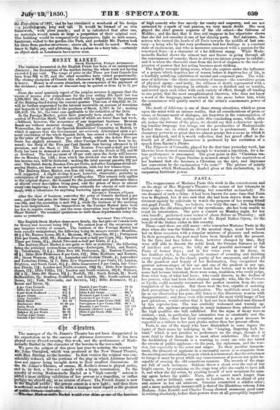p atm The manager of the St. James's Theatre has
not been disappointed in Ins expectation as to the success a Adrienne Le-concrete% It has been played every French. evening this week, and the performance of Made- moiselle Rachel in the character of the heroine is the town.taBc.
We gave the sutiect of this piece last year in noticing the version by Mr. John Oxenford, whirl was produced at the New Strand Theatre, with Mrs. Stirling as the heroine. In that version the original was con- siderably reduced, all the portions of the play in which Adrienne herself does not appear being brought down to their smallest dimensions. At the St. James's Theatre, of course, M. Scribe's drame is played entire, and is, in fact, a five-act comedy with a tragic termination. To the novelty of seeing Mademoiselle Rachel as a "high comedy" actress is added a most striking esfhibition of her powers as a tragedian, or rather perhaps we should say, as an actress of drama. The French drama is new to the English public ; the actress comes in a new light ; and thus there ier sufficient material to excite what a manager must regard as the greatest of public virtues—curiosity.
Whether Mademoiselle Rachel would ever shine as one of the heroines of high comedy who live merely for vanity and coquetry, and are not animated by a spark of real pension, we very much doubt. She once played the chief grande coquette of the old school—the Celimine of Molthre ; and the feat that it does not reappear in her repertoire shows that she did not consider it one of her shining parts. But Adrienne, the actress who turned the heads of all Paris towards the middle of last oen- tury—a being who by her very profession had her feelings in a constant state of excitement, and who is moreover consumed with a passion for the . renowned Saxe—is a character of a far different stamp. While Made- ! moiselle Rachel shows the utmost tact and finesse in going through all the convenanoes of comedy, there is always an intense purpose to exhibit; and it is when the character rises from the level of elegance to the real ex- pression of passion that her acting becomes most striking. The highly wrought dying seene, where she expires under the influence of a poison which deprives her of rearm before it deprives her of life, is a fearfully satisfying exhibition of mental and corporeal pain. The wild- ness of delirium—the idiotic uncertainty of manner—the convulsive groan of physical agony—and lastly, the stillness of death, represented with a fine feeling for the imposing in attitude—are so finished and so terrible, and crowd upon each other with such variety of effect, though all tending to one point, that the most unsophisticated observer, who does not know a word of the language, .nnert be struck by the scene before him, while the connoisseur will quietly marvel at the artist's consummate power of detail The death of Adrienne is one of those strong situations, which so press upon the mind with an intense reality, that all considerations of prose or verse, or literary merit of dialogue, are forgotten in the contemplation of the visible object. But, setting aside this concluding scene, which, after all, makes the fortune of the piece, we should say that a character speak- ing familiar language less brings out the peculiarities of Mademoiselle Rachel than one in which an elevated tone is predominant. Her de- clamatory power is so great that we almost grudge her a scene in which it is not displayed, and it is worth reflection that her grand effect in the fourth act of Adrienne Leeouereur is produced by her recitation of a speech from Raeme's ?Wee. The .Polyeuete of Corneille, played for the first time yesterday week, has likewise been deemed successful enough to warrant a repetition for a fus. Uwe performance is announced. The great point in this "Christian tra- gedy" is where the Pagan Pauline is so much struck by the martyrdom of her husband that she becomes a Christian on the spot, and expresaes her conversion by the exclamation " Je erois !" The picture of saintly enthusiasm which Mademoiselle Rachel gives at this exclamatioe, is of surpasting histrionic power.


























 Previous page
Previous page